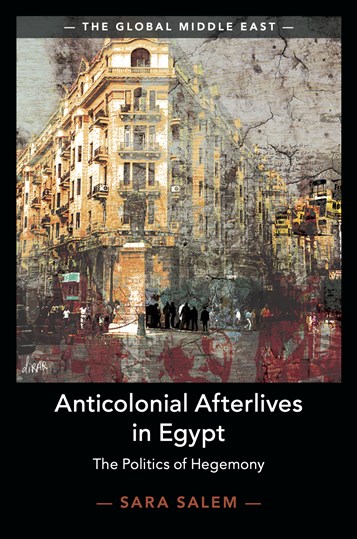Sara Salem, Anticolonial Afterlives in Egypt: The Politics of Hegemony (Cambridge University Press, 2020).
Jadaliyya (J): What made you write this book?
Sara Salem (SS): Egypt’s moment of decolonization has been central to Egyptian politics and society, and I have always felt that the complexity, nuance, and contradictions of that particular era are important to flesh out, to admit, and to explore. This is especially the case considering how often its symbols, ideas, and figures crop up in the strangest of places in contemporary Egypt. So partly, the book emerged out of an uncanny feeling that Nasserism was still with us, in many ways. After finishing the book, I realized that writing it was a way of processing contemporary events as well; of coming to terms of how past, present, and future blur into one another.
Given the idea of doing justice to an immensely powerful and complicated moment in history, one that I, like many others, am invested in and connected to. I was drawn to the idea of a form of writing that begins from both an acknowledgement of contradictions as well as an attempt to understand historical moments through themselves, rather than through what we might want those events to be from the vantage point of the present. This connection between past and present was one I was interested in unpacking, through asking whether we could center the anticolonial moment and connect it to contemporary debates about the 2011 revolution, bringing them into one shaky trajectory.
Finally, the book also represented a way of engaging in debates around connections between postcolonial theory and Marxism. These are two bodies of work that have tremendously impacted me, personally and academically. Yet they are also two bodies of work that are sometimes seen as being in opposition to one another, despite the long legacy of postcolonial scholars who have engaged in Marxist debates and forms of resistance. Thinking with Rahul Rao’s call for “reparative readings,” I wanted to write a piece that aimed to do that: to repair and open up space for a critical discussion around the connections as well as tensions between postcolonialism and Marxism in the particular context of Egypt.
J: What particular topics, issues, and literatures does the book address?
SS: The book addresses anticolonialism and its afterlives through the formation of Egypt’s postcolonial state and the evolution of Nasserism as a political project. The inspiration for this was a question I repeatedly found myself returning to: why was the Nasserist era so singular? It seemed to me that there was something different about the Nasser years, an intuition that an analysis of contemporary Egypt was incomplete unless I connected these two historical moments into one single trajectory. To explore this, I engage with various topics, issues, and literatures, from Gramscian debates around hegemony to sociological debates around haunting and ghosts.
The book is an imagined conversation between Frantz Fanon and Antonio Gramsci around questions of anticolonial and postcolonial nation-building, and thus in terms of literatures, the book engages with both postcolonial theory and Marxist theory, as well as broader work on Middle East politics and political economy. Using the lens of travelling theory (Edward Said), I ask what it would mean to understand Gramsci’s theory of hegemony as a travelling theory, looking at how Marxism stretches as it travels. A central claim of this book is that Marxism—as a “theoretical apparatus for reading history”—can offer a more telling account of revolution in Egypt. Reading Fanon through Said’s concept of traveling theory, and focusing particularly on his concept of “stretching Marxism,” I explore how Gramsci’s concepts travel to the Middle East, in effect bringing Fanon and Gramsci into a sphere of engagement. This conversation pushes us to think of who the ruling class is and how it is formed; how hegemonic projects are created and what kinds of energies they depend on; how subaltern classes relate to hegemony in the postcolony; and how postcolonial ruling classes relate to transnational capitalist classes; and finally how the material and ideological substance of anticolonialism, nationalism, and decolonisation created the particularities of hegemony in contexts such as Egypt.
The main argument the book makes is that Nasserism was a hegemonic project, because of both the context within which it was created, as well as political work the project itself carried out. This hegemony, however, can only be understood in reference to both empire and decolonization. Here I engage with both Fanon’s work as well as debates within Subaltern Studies around capitalism, dependency, and the violence of empire in its creation of a “local” capitalist elite. I also argue that the ruling class that was in power when the 2011 revolution broke out not only failed to create hegemony, but was also the product of the fall of Nasserism as the hegemonic project of decolonisation; this works to connect the revolutions of 1952 and 2011. By searching for hegemony, we find alternate explanations for the rise and fall of different political projects; in other words, I have thought of hegemony as a lens or a searchlight through which to excavate Egyptian political history.
In thinking through the projects that came after Nasserism and into the contemporary moment, I think with work on state violence and coercion, the political economy of neoliberalism, and how we can understand the past as blurred into the present. By using hegemony as a searchlight, I demonstrate that what characterizes successive political projects in Egypt is a decreasing ability to create hegemony, and a correlated increase in the use of coercion over consent; it is this that ultimately led to the 2011 revolution. Thus even in its absence, hegemony has much to tell us about the creation of political projects. A searchlight for hegemony brings to the surface the increasing turn to coercion and the overall weakness of Egypt’s ruling class in the lead up to the revolution. Rather than see this as a contemporary phenomenon, I instead locate it within the longer trajectory of decolonisation.
In the final part, I think along with Avery Gordon and Julietta Singh around questions of mastery, futurism, and haunting. What does it mean to think of afterlives, and how does it destabilize our understanding of anticolonialism as being firmly in the past? In particular, I use the concept of haunting to refer to how the spectre of the Nasserist project continued—and continues—to set the terms of the political and economic debate in contemporary Egypt. Such expectations are not merely rhetorical, but also have material repercussions. The book ends with Fanon, and his call to create a new world—one in which all of us are free, and in which decolonisation becomes a reality rather than a dream.
J: How does this book connect to and/or depart from your previous work?
SS: The book is connected to two streams of work: one that looked at questions of political economy in Egypt through the lens of Marxism, and the other that focused on Fanon’s work and its relevance to analyzing political change in contexts like Egypt. The book brings these two streams together—Gramsci/Marxism and Fanon—as well as taking more seriously what happens when concepts and theories travel, in this case from Southern Italy to Egypt. In a way, the book connects the disparate strands of work I had been engaging with before, transcending them while also acting as a form of closure. Because the book is based on my PhD, it was the end of a very long set of projects which also, through the process of writing the conclusion, opened up a new set of questions that I am excited to begin exploring.
J: Who do you hope will read this book, and what sort of impact would you like it to have?
SS: I hope that people interested in the politics of the Middle East and Africa will read this book, as the context of Egypt has many interesting parallels with other African countries, as well as countries in the Middle East.
I think people interested in Marxism and/or postcolonialism may find this interesting, as well as anyone interested in the work of Gramsci and/or Fanon.
I also hope this will be of interest to people thinking through anticolonialism, in all of its complexity, hope, and contradictions.
In terms of impact, I see this as a humble contribution to a bigger project around rethinking anticolonialism and its afterlives. I hope it opens up some space for us to think about this in the context of Egypt, and to move away of narratives of failure or romanticism when it comes to Nasserism as a political project. I also hope it opens up some more space for work on capitalism and political economy within Middle East Studies.
J: What other projects are you working on now?
SS: I am currently working on a project looking at temporality and haunting in the context of Egypt. This builds on the final chapter of the book, and explores how past events, figures, ideas, and hopes haunt both the present and the future. I am also working on a set of articles on gender, work, and capitalism (with Mai Taha), that looks at political economy, nationalism, and empire in Egypt through the lens of invisibilized women’s work. Finally, I am working on several articles that explore Marxism in postcolonial contexts, deepening some of the questions I touch on in the book but do not explore deeply.
Excerpt from the book
The afterlives of an event are often as revealing as the event itself, shedding light on pre-histories and futurities; on the multiple trajectories that could have been, and the one that eventually was. This is a book about the afterlives of Egypt’s process of decolonisation, and in particular the creation of a hegemonic project that reverberated far into Egypt’s future. Antonio Gramsci’s concept of hegemony is one that has been written about extensively, but materialised rarely. And yet in the two decades following Egyptian independence from Britain in 1952, we see the rise and fall of a period of hegemony in which anticolonialism, nationalism, and independent development came to define Egypt’s future. The fall of this project was just as momentous as its creation; and its afterlives were to travel far into the future, eventually culminating in a second revolution in 2011. This book is a journey between these two revolutions, situating 2011 within the broader trajectory of 1952.
The inspiration for this book started with the 2011 Egyptian revolution, but the book itself has largely turned out to be centred on a different revolution in Egyptian history: the coup d’état and popular revolution of 1952. In attempting to place 2011 within a historical trajectory, I found there was one part of this historical puzzle that struck me as unique, one era in modern Egyptian history that was particularly different from the others. I repeatedly found myself returning to a single question, one that was always at the back of my mind: why was the Nasserist era so singular? This singularity expressed itself in different ways: it is the era that has been most written about in post-independence Egypt; it is an era embroiled in intense controversy; it is an era that expresses itself in contradictory ways in the Egyptian popular imagination. It is also a project that very much set the limits of the political from 1952 onwards. It seemed to me that there was something different about the Nasser years, an intuition that my focus on 2011 was incomplete unless I connected these two historical moments into one single trajectory.
The contradictions of the Nasser years, as well as the highs and lows, suggested to me that something happened during that historical moment that was powerful enough to leave legacies into the present, legacies that were very much a part of the 2011 revolution. Nasserism as a political project was formed through the radical movements of the 1930s and 1940s, produced in and through the global politics of decolonisation, and representative of major shifts in elite formation in Egypt and the broader postcolonial world. While the Nasserist moment heralded the creation of a new nation based on industrialisation and anti-colonial nationalism, its defeat in 1967—after the six-day war with Israel—brought into being an entirely new historical moment. The rise of neoliberal restructuring in the late 1960s, and the acceleration of this in the mid-1990s, saw the end of Egypt’s project of decolonisation and the beginning of its integration into a new world order.
My journey to understand the singularity of the Nasserist project led me to Antonio Gramsci. Gramsci, a Southern Italian Marxist was a theorist whose most well-known work, The Prison Notebooks, is a mine of information spread across hundreds of individual notes that include everything from his major intellectual theorizations to small reminders to himself about future research. Written during his time in prison, the notes and their fragmentary nature reveal the astonishing feat Gramsci accomplished by writing them in those conditions, as well as the limits to trying to extract clearly-delineated theories from these notebooks. His concepts of hegemony, passive revolution and the historical bloc come together into a complex framework analysing society and social change, and his positionality as a Southern Italian led him to focus on inequalities produced within the nation; both of these make him invaluable to theorising on the uneven nature of global capitalism. His concept of hegemony is a unique articulation of what makes some political projects rule more effectively than others: a balance between consent and coercion, where coercion and consent exist in a dialectical relationship. This book argues that the Nasserist project remains the only instance of hegemony—or a hegemonic project—in modern Egyptian history, and that the 2011 revolution signified the end-point of its decline, decades after it was created. It is interested in understanding the power Nasserism exerted, both then and now, and the ways it seeps into the present. Understanding Nasserism as hegemonic, then, is an attempt at unpacking how different threads came together at a particular moment in time to create the possibility of hegemony in Egypt.
Despite beginning with Gramsci and his theory of hegemony, this book owes an equal debt to Frantz Fanon, without whom I would not have understood hegemony and its afterlives in the way that I have. Fanon’s work illuminated the centrality of decolonisation as a political process on the one hand, and the pitfalls embedded within anticolonial nationalism on the other. Fanon’s work has experienced something of a revival over the past several decades. Fanon’s call to ‘stretch Marxism’ and his detailed attention to the specificity of capitalism in the postcolony permeate this book, allowing me to approach hegemony and its afterlives in a way that made space for colonial histories. Beyond using Fanon’s theoretical and empirical work in this book, Fanon has also greatly influenced the ways in which I think of decolonisation and its contradictions. His thinking has been invaluable in positing the limitations but also the immense possibilities that coloured that particular moment. Moreover, his work is extraordinary in the agenda it put forth around the coming together of Marxism, postcolonialism, and capitalism.
This book is therefore an attempt at imagining a dialogue between Gramsci and Fanon, and by extension the theoretical canons of Marxism and postcolonialism. I ultimately argue that the synthesis between these two canons is fruitful, suggesting that there is something in Marxism that is important for postcolonial nations, as many Arab and African scholars and activists have said before me. It also suggests that there is—and this is more important—something in postcolonial contexts for Marxism. Bringing Gramsci and Fanon into conversation allows for a more complex appraisal of the Nasserist project and its afterlives. This conversation pushes us to think of who the ruling class is and how it is formed; how hegemonic projects are created and what kinds of energies they depend on; how subaltern classes relate to hegemony in the postcolony, and how postcolonial ruling classes relate to transnational capitalist classes; and finally how the material and ideological substance of anticolonialism, nationalism and decolonisation created the particularities of hegemony in contexts such as Egypt.






